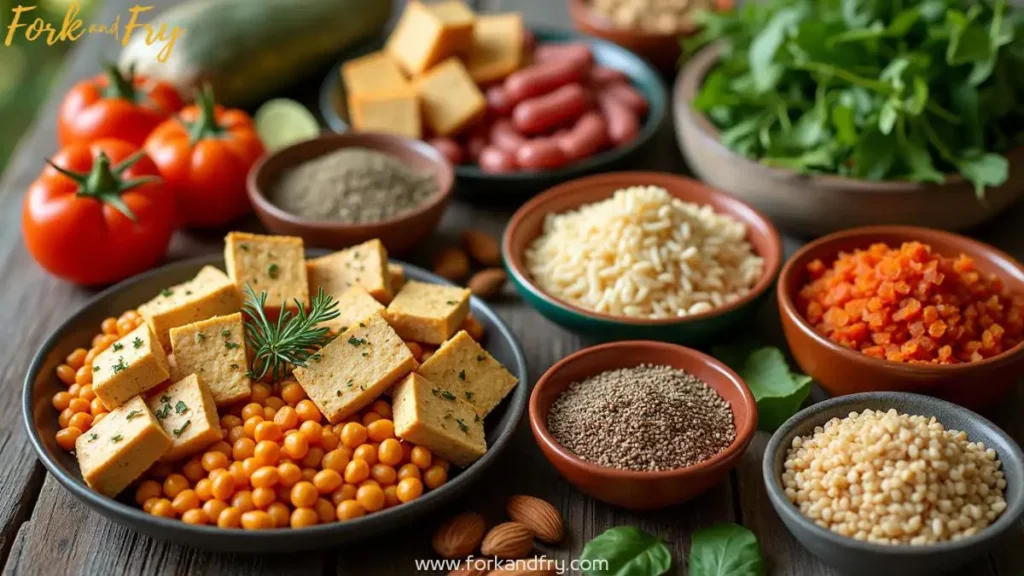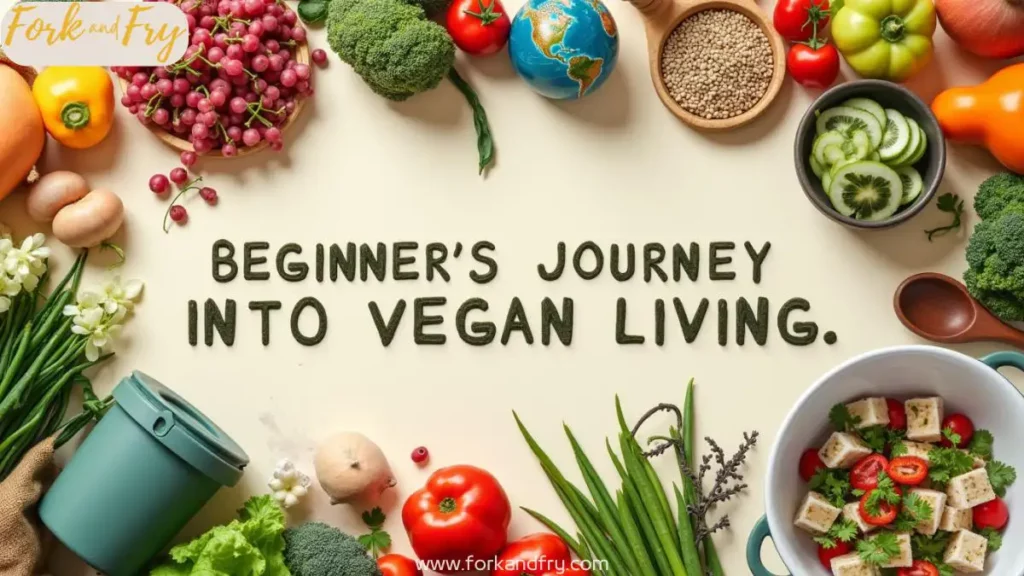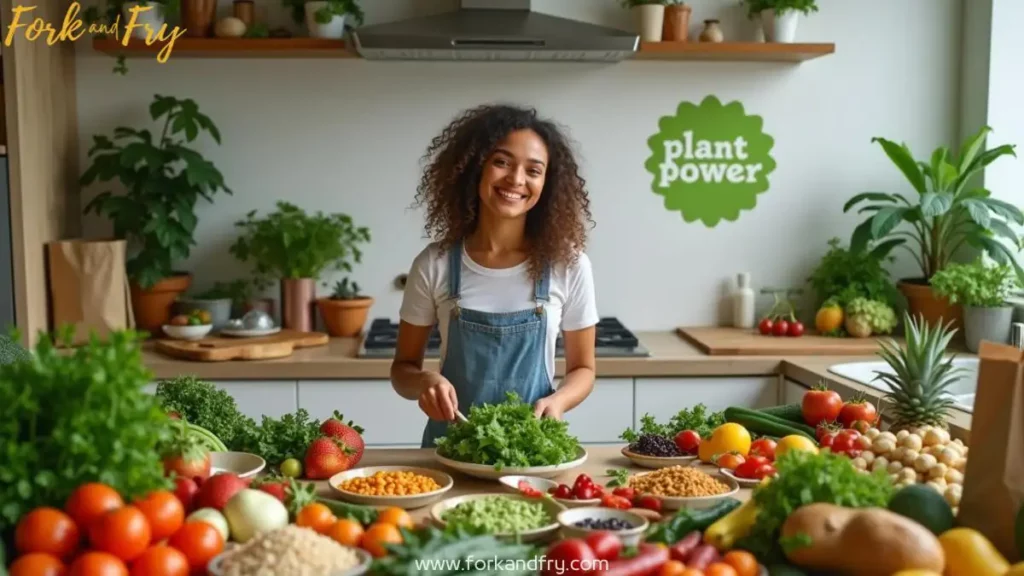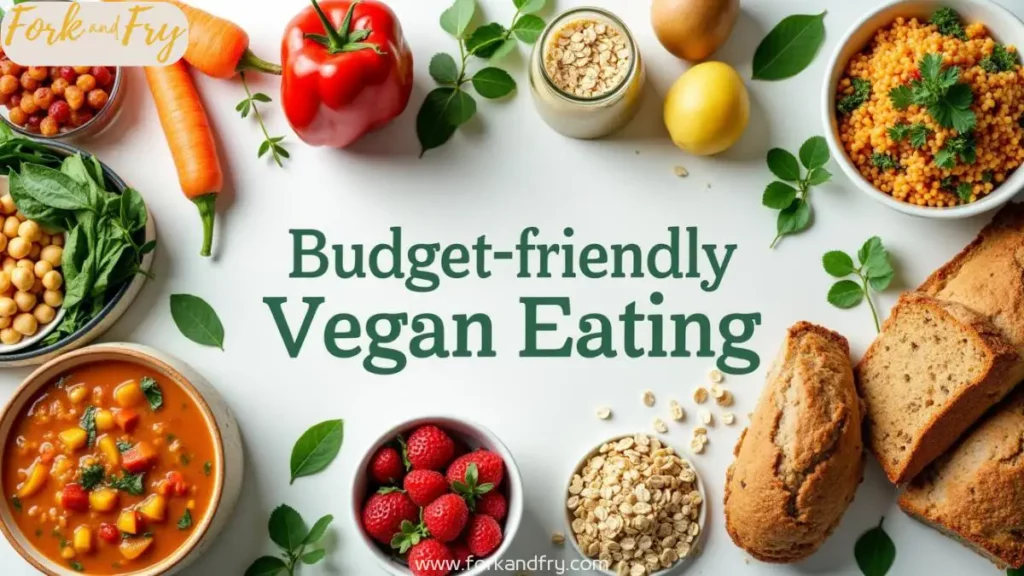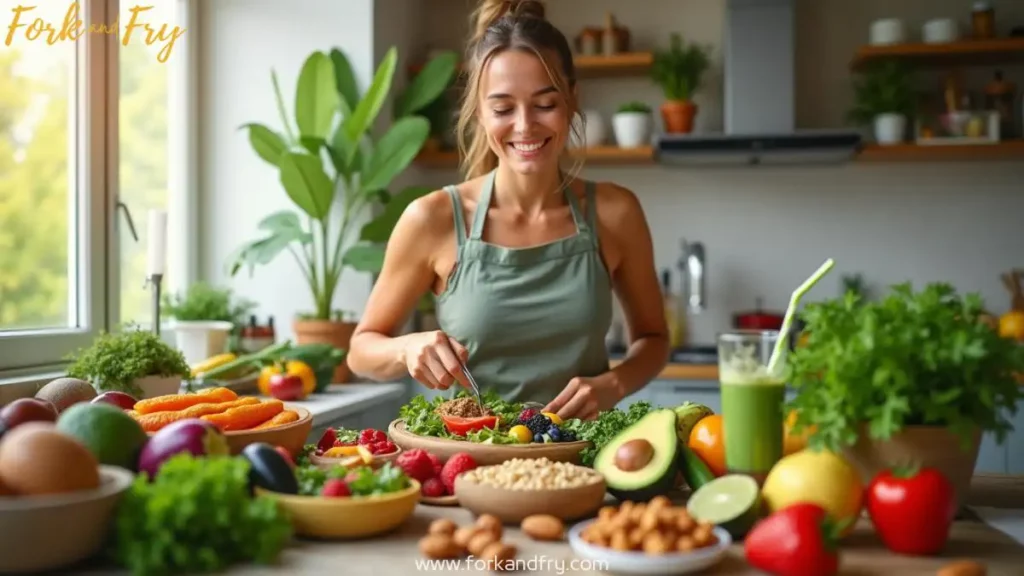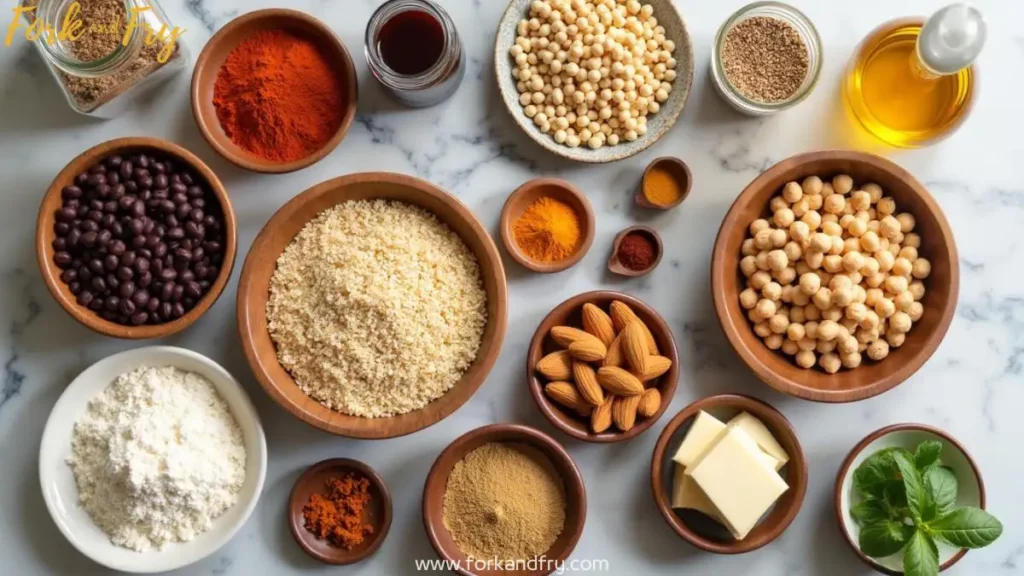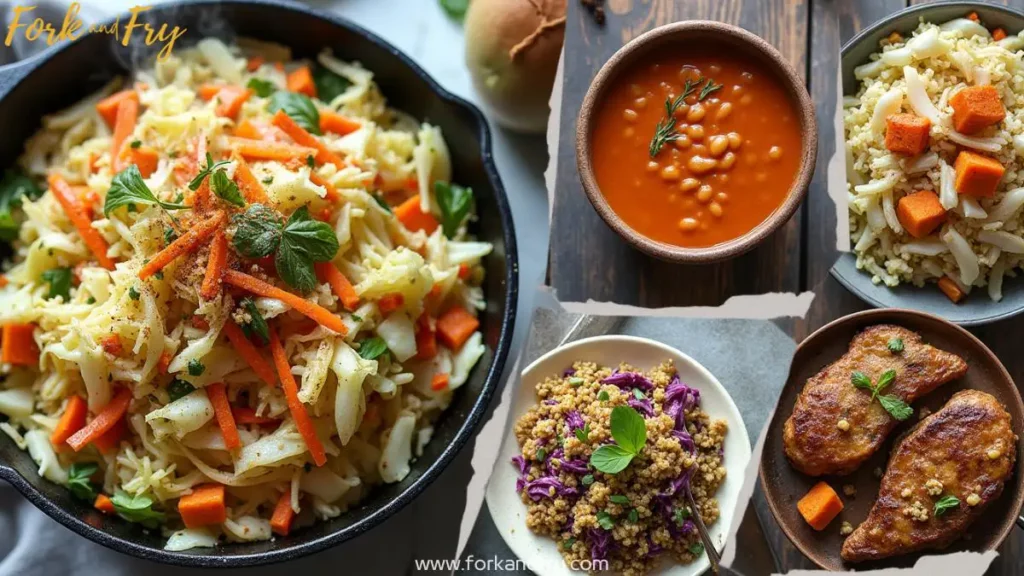Last updated on February 26th, 2025 at 11:33 am
Table of Contents
I used to doubt veganism, but now I see its power. Many people are scared to try a plant-based diet because of myths. But, the real story of veganism is much more freeing than you think.
In this article, we’ll tackle common vegan myths and reveal the truth. We’ll look at protein, nutrients, and cost of vegan diets. By the end, you’ll know how to add more plant-based foods to your life.
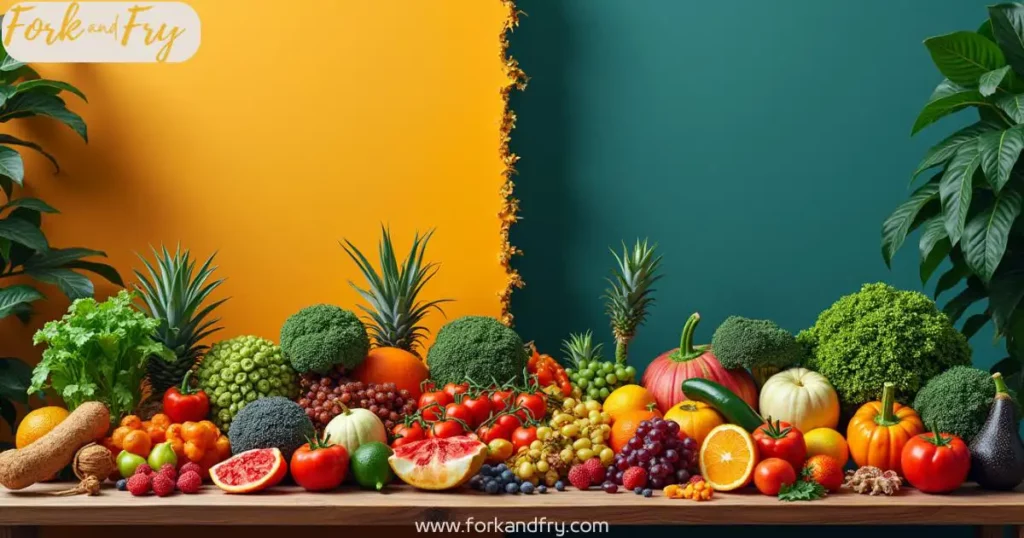
Let’s talk about protein, a big myth about veganism. A vegan diet can actually give you more than enough protein. Foods like legumes, grains, nuts, and soy are full of protein and taste great. With a bit of planning, you can get all the protein you need and enjoy a plant-based lifestyle.
Understanding Common Misconceptions About Plant-Based Diets
Veganism is becoming more popular as people look for sustainable and ethical ways to live. Yet, many myths still surround this choice, making it seem restrictive or lacking in nutrition. These myths are often based on a lack of facts and cultural biases.
The Rise of Veganism in Modern Society
Veganism is growing as people become more aware of its environmental and ethical benefits. This has led to more plant-based products and options, making vegan living easier.
Why Misconceptions Persist
Despite veganism’s growing popularity, myths about plant-based diets still exist. These myths often come from a lack of knowledge about plant-based nutrition and cultural biases.
The Importance of Evidence-Based Information
It’s key to fight these myths with facts and research. By doing so, we help people make informed choices about their diet. This way, they can enjoy the benefits of a plant-based lifestyle.
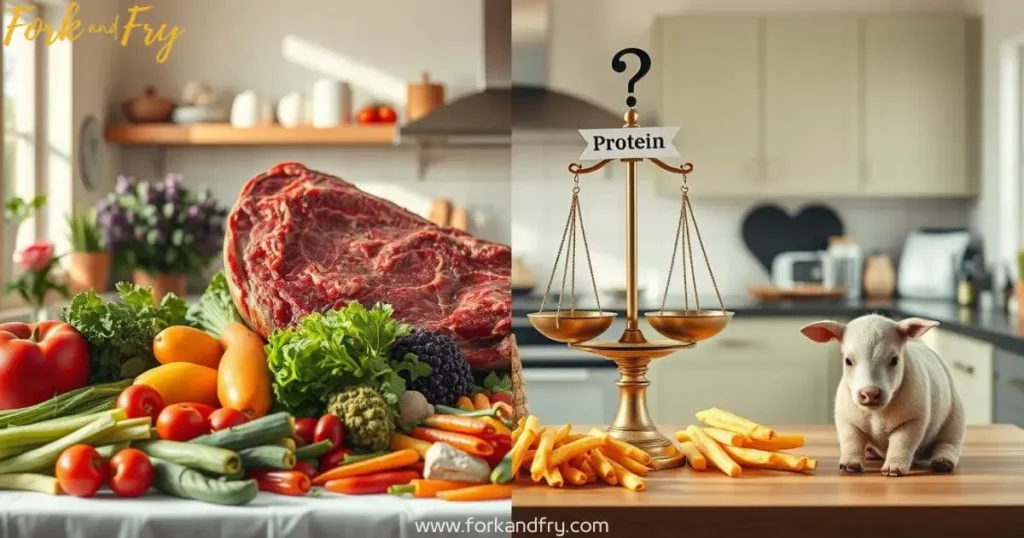
“Following a plant-based diet doesn’t have to mean completely avoiding all animal products. Even on a plant-based diet, consuming small portions of animal-based foods is acceptable.”
| Misconception | Fact |
|---|---|
| Vegans can’t get enough protein | Most Americans eat 1½ times more protein than they need each day. It takes just 1 cup of cooked beans to match the protein content in a 3-ounce portion of meat. |
| Plant-based diets are restrictive | Plant-based eating is limitless and diverse, not limited to salads only. There are numerous satisfying plant-based meat alternatives available today. |
| Veganism is expensive | Eating legumes, beans, and whole grains in place of meat or fish can be cost-effective. The human diet historically consists mainly of inexpensive foods like wheat, rice, corn, potatoes, and beans. |
By tackling these myths with facts, we can better understand plant-based diets. This knowledge helps people make informed choices, leading to a more sustainable and ethical future.
The Truth About Protein on a Vegan Diet
Many think a vegan diet lacks protein, but it’s not true. With careful planning, a vegan diet can provide all the protein your body requires. Plant-based proteins are also lower in fat, higher in fiber, and packed with vitamins, minerals, and antioxidants.
Complete Protein Sources for Vegans
Vegans have many complete protein sources. These foods have all the essential amino acids. Some top options include:
- Legumes (lentils, chickpeas, kidney beans)
- Soy products (tofu, tempeh, edamame)
- Whole grains (quinoa, brown rice, oats)
- Nuts and seeds (almonds, cashews, chia, flax)
By mixing these protein-rich foods, vegans can meet their daily protein needs. They don’t need animal products to do so.
Daily Protein Requirements and Planning
Adults need 0.8 grams of protein per kilogram of body weight daily. Vegans can easily meet this with the right planning. For instance, a cup of cooked lentils has 18 grams of protein. Tofu has 20 grams per serving.
By eating a variety of plant-based proteins, vegans get all the amino acids they need.
Plant-Based Protein Success Stories
Many top athletes and bodybuilders follow a vegan diet. They show that plant-based diets support athletic performance. Famous vegan athletes like Nate Diaz, Serena Williams, and Novak Djokovic are examples.
Barny du Plessis, a vegan bodybuilder, is another success story. He won Mr. Universe and shows a vegan diet can help build muscle and strength.
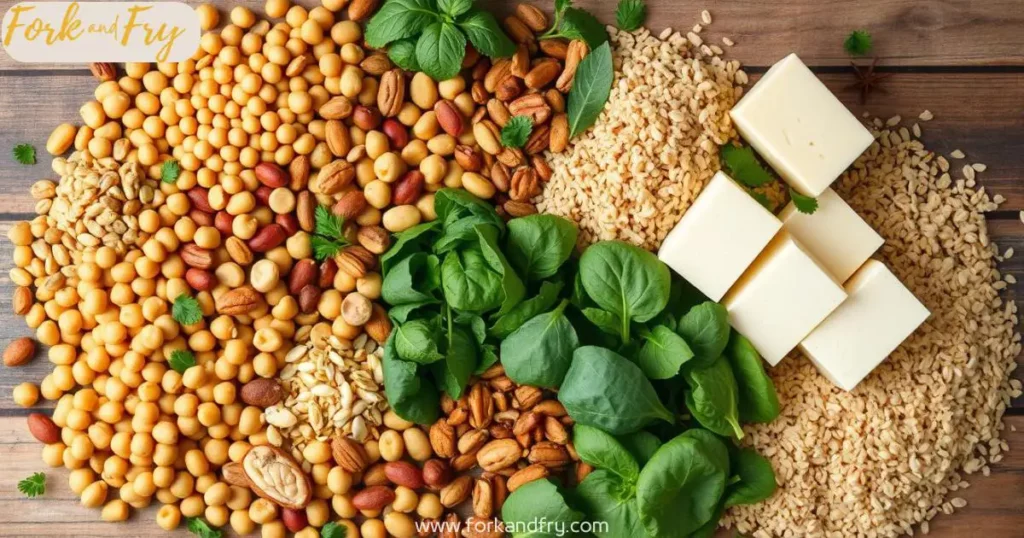
Debunking the Cost Myth: Affordability of Vegan Lifestyles
Many think vegan diets are pricey, only for the wealthy. But, a plant-based budget can be very affordable. While vegan processed foods and meat substitutes are pricey, whole foods like grains, legumes, and seasonal produce are cheap.
Dr. Michael Greger says we only need about 42 grams of protein daily. This is much less than the 80 grams most people eat. So, using affordable protein sources like beans, lentils, and tofu is both healthy and budget-friendly.
Whole foods, plant-based meals cost under $5 to make. They include brown rice, black beans, kale, sweet potatoes, and fruits and veggies in season. Potatoes and oranges are the top veggies and fruits in the American diet, showing vegan options are accessible.
Vegan diets can be cheaper or pricier than traditional diets, depending on food choices. But, focusing on whole foods and cooking at home makes affordable veganism possible. With more plant-based restaurants and vegan options, plant-based budget choices are easier than ever.
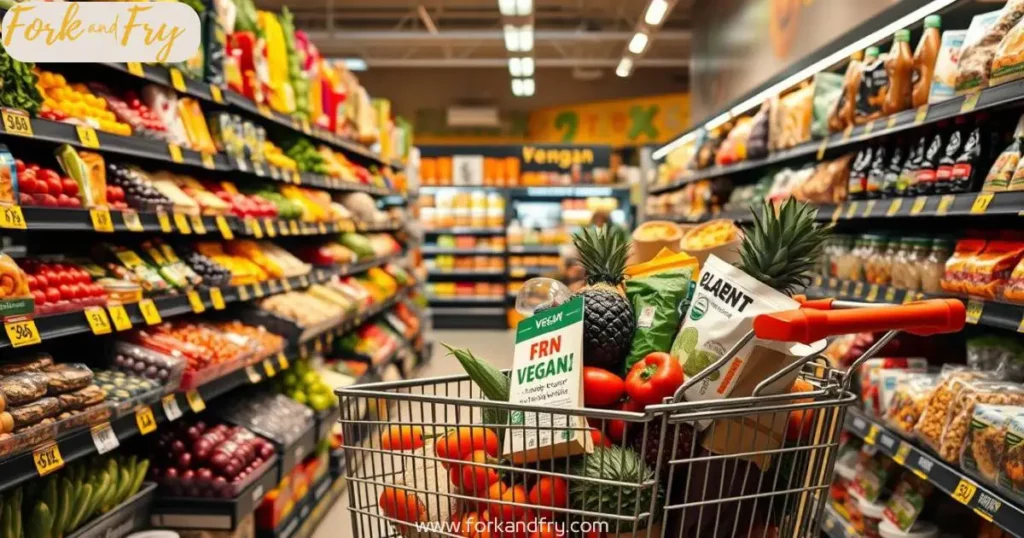
Despite the myth, a well-planned vegan lifestyle can be both healthy and affordable. By choosing whole foods, cooking at home, and using seasonal produce, you can enjoy a plant-based budget without spending a lot.
Essential Nutrients: Iron and Calcium on a Plant-Based Diet
Many think vegan diets lack iron and calcium. But, the truth is different. With some knowledge and planning, you can get all the iron and calcium you need from plants.
Plant-Based Iron Sources and Absorption
Iron is found in many vegan foods like lentils, chickpeas, tofu, quinoa, and spinach. To better absorb iron, eat foods high in vitamin C, like citrus fruits or bell peppers, with your iron sources. This combo helps your body use plant-based iron more effectively.
Meeting Calcium Needs Without Dairy
Dairy isn’t the only source of calcium. You can get plenty of calcium from almonds, sesame seeds, tofu, fortified plant milks, and leafy greens like kale and broccoli. With the right plan, you can get all the calcium you need without animal products.
Combining Foods for Maximum Nutrition
Combining different nutrients is key to a good plant-based diet. Pairing iron-rich foods with vitamin C-rich foods boosts iron absorption. Also, adding healthy fats like those in avocados or nuts helps absorb vitamins A, D, E, and K better.
Knowing about vegan-friendly iron and calcium sources and how to improve nutrient absorption lets you confidently meet your needs on a plant-based diet.
Vegan Myths: Popular Misconceptions Examined
There are many myths and misconceptions about veganism in our society. But, when we look closer at the facts, we find the truth behind these beliefs.
One myth is that vegan food is bland and tasteless. But, the plant kingdom has a wide range of flavors and textures. With a little creativity and the right seasonings, vegan dishes can be just as tasty as any other.
Another myth is that a vegan diet lacks variety. But, the options are endless. You can find a variety of fruits, vegetables, grains, legumes, nuts, and vegan alternatives to animal products.
Some people think that vegans struggle to meet their protein needs. But, research shows that a well-planned plant-based diet can provide all the essential amino acids. It can meet the body’s protein requirements.
It’s also a myth that vegan diets are more expensive. With proper planning and focusing on whole, unprocessed foods, a vegan lifestyle can be affordable. It can even be cheaper than a traditional omnivorous diet.
In conclusion, it’s time to bust the myths and understand the truth about veganism. By separating fact from fiction, we can learn more about the benefits and realities of this growing movement.
“Veganism is not a diet, it’s a lifestyle. It’s about making conscious choices that align with your values and beliefs.” – Unknown
Athletic Performance and Plant-Based Diets
Vegan athletes are doing great in sports, despite what some think. Guys like Patrik Baboumian, the world’s strongest man, and Scott Jurek, a famous runner, show that plant-based diets work well for athletes.
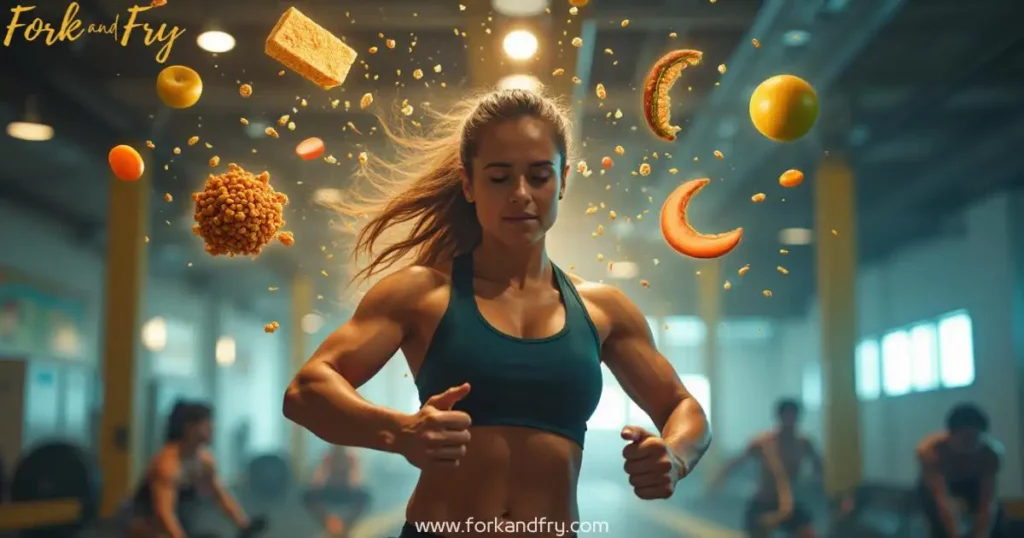
Professional Athletes Thriving on Vegan Diets
The documentary “The Game Changers” highlights top vegan athletes. They’ve kept their competitive edge and even beaten non-vegan athletes. This shows a vegan diet can give all the nutrients needed for sports.
Meeting Energy Requirements for Sports
Vegan athletes can get all the energy they need from plants. Foods like beans, lentils, nuts, seeds, and whole grains give the right calories and nutrients for tough workouts.
Recovery and Plant-Based Nutrition
A plant-based diet also helps with recovery and performance. Studies say it can lower inflammation and help muscles heal faster. This could give vegan athletes an advantage in training and competitions.
The idea that athletes can’t do well on a vegan diet is wrong. With the right plant-based sports nutrition, vegan athletes show that being kind to animals and the planet doesn’t mean sacrificing performance.
The Diversity of Vegan Cuisine
Vegan food is not boring or lacking in variety. The plant-based world is diverse and exciting. You can find everything from hearty stews to sweet desserts. Most seasonings and flavors are plant-based, offering endless options for vegan culinary creativity.
More and more vegan cookbooks, blogs, and restaurants are popping up in the U.S. This shows the wide range of plant-based meals people enjoy. With a bit of creativity, a vegan diet can be as diverse and fulfilling as any other.
“The vegan culinary scene has truly come into its own, offering something for every palate. From hearty comfort foods to innovative plant-based dishes, the possibilities are endless.” – Jamie Oliver, celebrity chef and cookbook author
Looking for a savory stir-fry, a comforting casserole, or a rich dessert? Vegan cuisine has it all. Exploring vegan cuisine opens up a world of flavors and new favorite dishes.
Vegan food spans traditional cuisines to modern fusion. By trying different ingredients and techniques, vegans can create a rich and varied culinary experience. This shows vegan food is far from limited or monotonous.
Embracing the Diversity of Vegan Cuisine
- Explore a wide range of vegan recipes from around the world, such as Indian curries, Mexican tacos, and Italian pastas.
- Discover the versatility of plant-based proteins like tofu, tempeh, and seitan, which can be used in a variety of vegan culinary creations.
- Indulge in decadent vegan desserts, from creamy cashew-based cheesecakes to rich chocolate cakes made with dairy-free ingredients.
- Experiment with unique and flavorful plant-based ingredients, such as jackfruit, aquafaba, and nutritional yeast, to elevate your vegan meals.
Embracing vegan cuisine’s diversity leads to a culinary adventure. It satisfies your taste buds and supports your values. Whether you’re a seasoned vegan or new to plant-based options, there’s something for everyone in the world of vegan recipes and plant-based meals.
Environmental Impact of Plant-Based Diets
Vegan and plant-based diets are good for the planet. They can cut down your carbon footprint. This helps make the future more sustainable.
Carbon Footprint Comparison
Meat production is a big source of greenhouse gas emissions. Animal agriculture plays a significant role in contributing to climate change. On the other hand, vegan environmental impact is much lower.
Studies suggest a plant-based diet could lower food-related emissions by up to 70% by 2050. It could also reduce health risks by up to 10%.
Sustainable Food Production
Vegan farming is more efficient and better for the planet. It helps keep biodiversity and the planet healthy.
Only 29% of food-related emissions come from sustainable diet plant-based foods. Meat and dairy products account for 57%. Choosing a plant-based lifestyle can greatly reduce your environmental impact.
Water Conservation Benefits
A vegan environmental impact also means using less water. Vegan diets use 54% less water than diets high in meat. This is important because water scarcity is a big issue worldwide.
By choosing a plant-based eco-friendly diet, you help the planet. You support a more sustainable future.
B12 and Omega-3: Managing Essential Nutrients
A vegan diet is rich in many nutrients, but two are special: vitamin B12 and omega-3 fatty acids. Vegans need to plan well and use supplements to get these nutrients. This way, they can stay healthy without eating animal products.
Vegan B12 Sources
Vitamin B12 is mainly found in animal foods like meat, dairy, and eggs. Vegans get B12 from fortified foods or supplements. Good sources include fortified plant milks, cereals, and nutritional yeast.
Plant-Based Omega-3
Omega-3s are key for heart and brain health. Vegans can get them from plants like flaxseeds, chia seeds, hemp seeds, and algae supplements. Adding these foods and supplements to a vegan diet helps meet omega-3 needs.
Vegan Supplements
Even with a good vegan diet, supplements might be needed for B12 and omega-3s. There are vegan-friendly options like B12 tablets, sprays, and algae-based omega-3 capsules. These help vegans stay healthy and avoid nutrient gaps.
| Nutrient | Vegan Sources | Recommended Daily Intake |
|---|---|---|
| Vitamin B12 | Fortified plant-based milks, cereals, nutritional yeast | 2.4 micrograms (mcg) |
| Omega-3 Fatty Acids | Flaxseeds, chia seeds, hemp seeds, algae supplements | 1.1-1.6 grams (g) |
Knowing the importance of B12 and omega-3s is key. Vegans can meet their needs by using the right sources and supplements. This way, they can stay healthy and thrive.
Debunking the Myth: “All Vegan Food is Healthy”
Many think all vegan junk food is healthy. But, a balanced vegan diet can be either healthy or unhealthy. Processed vegan junk food often has too much sugar, salt, and unhealthy fats.
To stay healthy, eat whole, unprocessed plant-based foods. This diet includes foods like fruits, vegetables, whole grains, legumes, nuts, and seeds. They give you the vitamins, minerals, and fiber you need.
More people are calling themselves vegan, and plant-based food sales are up. But, not all vegan junk food is good for you. Vegans need to choose wisely to get all the nutrients they need.
| Nutrient | Recommended Daily Intake | Common Vegan Sources |
|---|---|---|
| Protein | 10-35% of total daily calories | Legumes, tofu, tempeh, seitan, nuts, seeds |
| Iron | 1.8 times more than non-vegetarians | Lentils, spinach, cashews, quinoa |
| Calcium | 1,000-1,200 mg per day | Fortified plant-based milk, tofu, leafy greens |
Knowing the value of a balanced vegan diet helps. By making smart choices, vegans can enjoy a healthy plant-based eating lifestyle. They can avoid the bad effects of too much vegan junk food.
“Not all vegan foods are created equal. It’s important to focus on whole, nutrient-dense plant-based options to maintain a truly healthy lifestyle.”
Conclusion
The vegan lifestyle is nutritious, varied, and sustainable when planned well. It’s not about protein deficiency, high cost, or bad taste. It’s a choice for health, the environment, or ethics.
Research shows vegan lifestyle benefits like lower heart disease and cancer risks. Plant-based diet advantages also include being better for the planet and affordable for many. A well-planned vegan diet meets all nutritional needs, debunking myths of deficiencies.
Exploring vegan cuisine and affordable, nutritious plant-based foods can be rewarding. As veganism gains acceptance, a more sustainable and compassionate future is closer.
FAQ
Do vegans struggle to consume enough protein?
No, a vegan diet can easily provide enough protein. Foods like legumes, whole grains, nuts, seeds, and soy products are great sources. Vegans can meet daily protein needs without animal products.
Is a vegan diet more expensive than a non-vegan diet?
No, veganism can be affordable. While some vegan foods are pricey, staples like rice, beans, and veggies are cheap. Buying in bulk and cooking at home can save money.
Do vegans struggle to get enough iron and calcium?
No, vegans can get enough iron and calcium from plants. Iron is in lentils, chickpeas, tofu, quinoa, and spinach. Calcium is in almonds, sesame seeds, tofu, and fortified milks. With planning, vegans can meet their needs.
Is vegan food bland and lacking in variety?
No, the plant kingdom offers many options. From fruits and veggies to grains and legumes, vegan food is diverse and tasty. Vegan alternatives are also growing, offering more choices.
Can athletes thrive on a vegan diet?
Yes, many vegan athletes, like Patrik Baboumian and Scott Jurek, show it’s possible. They get all the nutrients they need, including protein and fats. Vegan diets may also reduce inflammation and aid in recovery.
Is all vegan food inherently healthy?
No, vegan diets can be healthy or unhealthy. It depends on the food choices. A balanced diet should include whole foods like fruits, veggies, and grains. Vegans need to ensure they get all necessary nutrients.
Do vegans need to supplement with B12 and omega-3 fatty acids?
Yes, vegans need to pay special attention to B12 and omega-3s. B12 is found in animal products, so fortified foods or supplements are needed. Omega-3s are in flaxseeds, chia seeds, and algae-based supplements. With planning and supplements, vegans can meet their needs.
What is the environmental impact of a vegan diet?
Vegan diets are generally better for the planet. They require less water and can preserve biodiversity. Vegan farming is more efficient, helping the environment.
